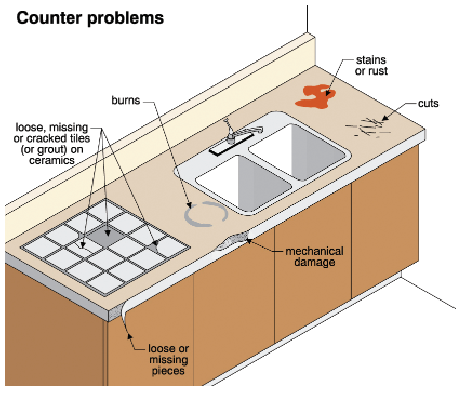Counters and cabinets have two distinct roles in homes. From a functional standpoint, counters provide working surfaces in kitchens, bathrooms, pantries and bars. Cabinets provide storage facilities in kitchens, bathrooms and other rooms. Counters and cabinets also play a strong role in the visual, cosmetic and architectural side of things. Cabinetry can be a focal point in a room and often, the cabinetry is an indicator of the quality of construction throughout the home. As inspectors, we focus on the functional and performance side of things.
Counter Materials
A variety of materials are used for counters, with varying price points. Each material has pros and cons. Some of the more popular choices for countertops include the following:
Plastic laminate: Developed in the early to mid-1900s, laminate countertops still are a popular choice. A plastic sheet is adhered to a particleboard base in the factory. These countertops tend to be easier to work with because they are relatively light and easy to cut on site. Depending on the quality of the laminate, this material also is relatively heat- and stain-resistant, although damage from cutting utensils is a common issue.
Butcher block: Pieces of wood are glued together and sanded to create a smooth surface. These countertops need to be sealed after manufacture and then periodically after installation. Without sealing, the wood pieces can warp due to moisture, and germ and pathogen retention can become an issue. Although most countertops are maintenance-free, butcher block is an exception. Wood is subject to burn marks from hot pots, for example. Some kitchens feature sections of butcher block, blended with other countertop materials.
Natural stone: Marble and granite are the two most popular choices for natural stone countertops. To manufacture the countertop, natural rock is cut and polished to achieve a smooth finish. The finish can be glossy, matte or honed. Depending on how it is finished, the same stone can provide different looks. Porosity is an issue with some natural stone countertops, which may discolor without regular sealing. Marble stains much more easily than granite.





